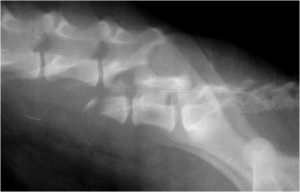Orthopedic Surgery
Spinal Fractures
Learn more about spinal fractures below.

Cranial Cruciate Ligament Injuries

Contrary to the belief that a spinal fracture results in a permanent, debilitating injury, the prognosis for such fractures can often be hopeful.
Factors such as the fracture location, degree of displacement, and present neurologic signs before stabilization affect the outcome of recovery. The prognosis for a return to function is favorable for patients who have maintained motor function or pain perception to their limbs. If there is a loss of deep pain (meaning there is no recognition when extreme pressure is applied to a digit), the prognosis for a return to normal activity is unlikely. Not all spinal fractures require surgical stabilization. Many can be treated through routine rest and following strict exercise restrictions for 8 to 12 weeks. Surgical stabilization is required in some cases and will often reduce the recovery period in patients where conservative management would have also been effective. Dr. Wheeler has extensive experience in spinal fracture repair. During his residency, Dr. Wheeler developed a technique to stabilize spinal fractures using minimally invasive percutaneous (stabilization through tiny incisions) stabilization using external skeletal fixation. This work won several awards from the American College of Veterinary Surgeons and the Veterinary Orthopedic Society. It earned a Master’s Degree from the University of Florida.

